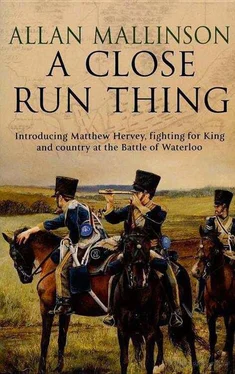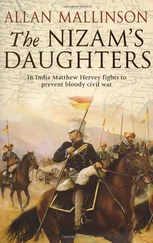Allan Mallinson - A Close Run Thing
Здесь есть возможность читать онлайн «Allan Mallinson - A Close Run Thing» весь текст электронной книги совершенно бесплатно (целиком полную версию без сокращений). В некоторых случаях можно слушать аудио, скачать через торрент в формате fb2 и присутствует краткое содержание. Год выпуска: 1998, ISBN: 1998, Издательство: BANTAM PRESS, Жанр: Исторические приключения, на английском языке. Описание произведения, (предисловие) а так же отзывы посетителей доступны на портале библиотеки ЛибКат.
- Название:A Close Run Thing
- Автор:
- Издательство:BANTAM PRESS
- Жанр:
- Год:1998
- ISBN:9780553507133
- Рейтинг книги:3 / 5. Голосов: 1
-
Избранное:Добавить в избранное
- Отзывы:
-
Ваша оценка:
- 60
- 1
- 2
- 3
- 4
- 5
A Close Run Thing: краткое содержание, описание и аннотация
Предлагаем к чтению аннотацию, описание, краткое содержание или предисловие (зависит от того, что написал сам автор книги «A Close Run Thing»). Если вы не нашли необходимую информацию о книге — напишите в комментариях, мы постараемся отыскать её.
A Close Run Thing — читать онлайн бесплатно полную книгу (весь текст) целиком
Ниже представлен текст книги, разбитый по страницам. Система сохранения места последней прочитанной страницы, позволяет с удобством читать онлайн бесплатно книгу «A Close Run Thing», без необходимости каждый раз заново искать на чём Вы остановились. Поставьте закладку, и сможете в любой момент перейти на страницу, на которой закончили чтение.
Интервал:
Закладка:
ALLAN MALLINSON
A CLOSE RUN THING
To
The Light Dragoons
(formerly the 13th/18th and the 15th/19th Hussars)
In whose history, character and personalities I have
found much inspiration for this story.
AUTHOR’S NOTE
This is not just the story of an officer in the Duke of Wellington’s army: it is the story of a regiment — that peculiarly British institution which John Keegan, the most percipient historian and observer of all things military, has described as ‘an accidental act of genius’. Every regiment was — still is — different, and revelled in that difference. The difference was not just in the people but in the regiment’s history and traditions — the received notions of how things should be done, the esprit, the spirit.
The 6th Light Dragoons are a fictitious regiment, but the events in which they take part are historical fact. The major characters outside the regiment are real figures of history. Occasional liberties have been taken — General Slade did not go to Ireland in 1814, for instance — but not in any way that changes the historical plausibility of the story.
The army of 1814 was singular. It had endured five years of campaigning in the Peninsula, and it had gone from success to success, until the duke was able to remark, famously, that it ‘could go anywhere and do anything’. Sir Charles Oman, one of the two greatest historians of the campaign (the other being Sir William Napier), made also this interesting observation: ‘A very appreciable number of men were of a religious turn — a thing I imagine to have been most unusual in the army of the eighteenth century.’ (Wellington’s Army, 1809–1814.)
The army was not, of course, without its faults. Neither was the duke. One of the most controversial matters was the purchase of commissions, the system by which officers of the cavalry and the infantry bought their promotion, a system that the duke strenuously upheld long after the war. This is a complex issue, however, and not one to be taken at face value. I know of no better (or more entertaining) explanation of it than that in Volume One of the Marquess of Anglesey’s History of the British Cavalry 1816–1919, which, incidentally, is also the most readable authority on horse-soldiering in the early nineteenth century.
Readers who wish to know more about the organization and equipment of the army at this time should consult the detailed reference works by Mr Philip Haythornthwaite: they have no equal. I am indebted, too, to Major (retd) John Oldfield, sometime curator of the Small Arms Museum at the School of Infantry, Warminster. The museum is an unrivalled collection of both weapons and knowledge, and (though the fact is little known) is open to visitors, by appointment. My wife, whom I met in a stable, has been an unfailing aid in finding the right words to describe the horses and their world: she has kept me from the worst metaphorical falls.
Any Englishman writing even a little about Ireland needs an Irish interlocutor of exceptional patience. I have been immensely fortunate in the friendship and support of Brigadier-General (retd) Pat Hogan, late of the Irish Defence Forces and president of the Irish Military History Society. But he can in no way be held responsible for anything that smacks of perfide Albion.
I owe a very great deal indeed to Mr Patrick O’Brian — directly and indirectly. His Aubrey/Maturin stories enthralled me for so many years that I began to fret for anything remotely comparable for the cavalry of that period, until eventually I found the resolve to attempt, myself, to do something about it. He has been most generous in giving me advice and encouragement.
I must acknowledge perhaps my greatest debt, however, to Paula Levey (Mrs Piers Fletcher) — soldier’s daughter, soldier’s sister, and wife of a former soldier, who, as editor of the early manuscript, knew exactly what was what, and never flinched from telling me.
‘Oh! pity the condition of man, gracious God! and save us from such a system of malevolence, in which all our old and venerated prejudices are to be done away, and by which we are taught to consider war as the natural state of man, and peace but as a dangerous and difficult extremity. Sir, this temper must be corrected. It is a diabolical spirit and would lead to interminable war … At what time did we ever profit by obstinately persevering in war?’
Charles James Fox, to the House of Commons,
3 February 1800
Britain had persevered in war with revolutionary France, with but one short break, since 1793. The Royal Navy, at Aboukir in 1798 and Trafalgar in 1805, had confined Bonaparte to Europe; British money had financed the allies when they were ready to come forward; and a British army in the Iberian peninsula had, from 1809, maintained a front which had drained French resources and given hope to other Europeans. By the beginning of 1814, Bonaparte could defend only France. Russian, Prussian and Austrian armies were closing in from the east, while the British, already in the Pyrenees, stood ready to invade from the south-west.
PART ONE. PRIDE AND PREJUDICE
‘But if you cannot make peace with Buonaparte in the winter, we must run at him in the spring.’
The Marquess (later the Duke) of Wellington to the Cabinet,
10 January 1814
CHAPTER ONE. IN THE HEAT OF BATTLE
The Convent of St Mary of Magdala,
Toulouse, 12 April 1814
‘It is a very singular thing indeed, Mr Hervey, for a cornet to be placed in arrest upon the field of battle.’
Joseph Edmonds was deploying all his considerable facility with words in order to convey the gravity of the matter at hand.
‘Tell me, if you please, precisely and dispassionately, the circumstances by which this was brought about.’
Cornet Hervey stood rigidly to attention before the major’s desk, his left hand clasping the sword scabbard to his side, his right hand clenched with the thumb pointing downwards along the double yellow stripe of his overalls. His eyes were set front, and filling the limited arc of their fixed gaze were two symbols which, while if not to his mind entirely contradictory, in their juxtaposition seemed somehow incongruous. For on the wall behind the desk was a large wooden cross with a painted figure of the crucified Christ. Next to it — perhaps even leaning against it — was the regimental guidon, a piece of red silk on a beechwood stave, its richly embroidered battle honours still resplendent despite the staining and fading. The irony, that he had been raised in a household whose world was shaped by the first symbol, and had then elected to throw himself wholeheartedly behind the second, was not lost on him even at this exigent moment. He had little imagined such a convergence, however, nor its place — a nunnery hastily and rudely requisitioned for the purposes of the military. He drew in a deep breath, his stomach feeling tighter than ever it had done when he had been awaiting combat, and began the recollection of the events which had brought him now before his commanding officer.
‘Sir, yesterday forenoon I was in command of the flank picket, as you had placed me, one quarter of a league to the west of our lines of attack upon this city …’
The fateful encounter with authority had begun spectacularly. Edmonds had not expected any affair on the left flank. Not that that was why he had entrusted the picket to Hervey: he had long been of the conviction that the worst that could happen in battle usually did (and as a consequence he had never been wrong-footed — at least, that is, in the field), and Hervey and his standing patrol were a trusty yet economical insurance.
Читать дальшеИнтервал:
Закладка:
Похожие книги на «A Close Run Thing»
Представляем Вашему вниманию похожие книги на «A Close Run Thing» списком для выбора. Мы отобрали схожую по названию и смыслу литературу в надежде предоставить читателям больше вариантов отыскать новые, интересные, ещё непрочитанные произведения.
Обсуждение, отзывы о книге «A Close Run Thing» и просто собственные мнения читателей. Оставьте ваши комментарии, напишите, что Вы думаете о произведении, его смысле или главных героях. Укажите что конкретно понравилось, а что нет, и почему Вы так считаете.









